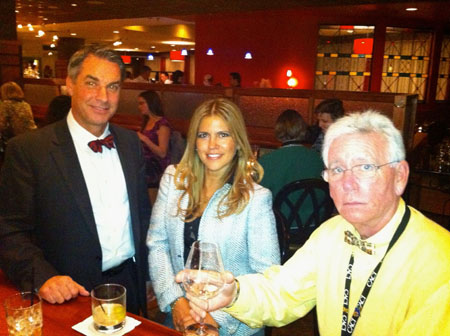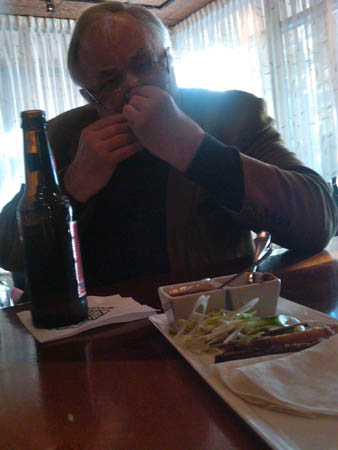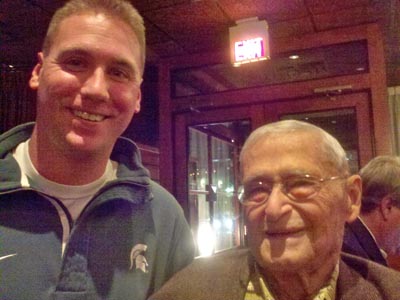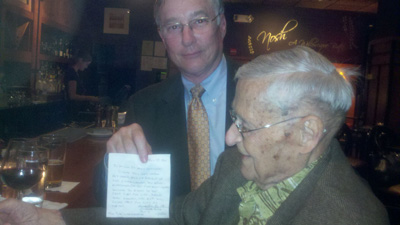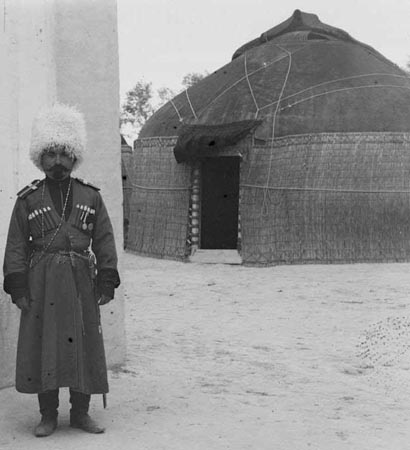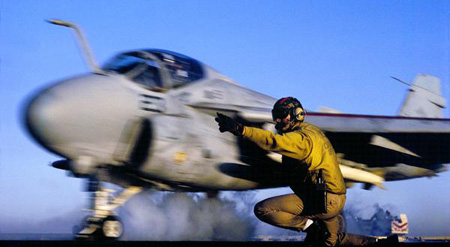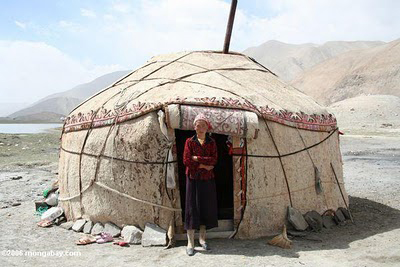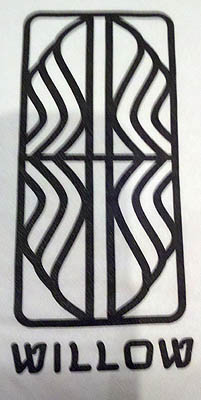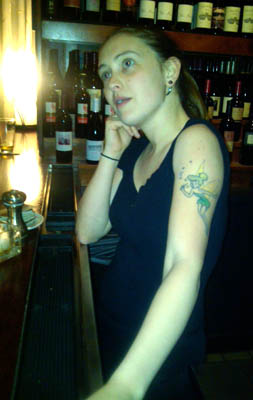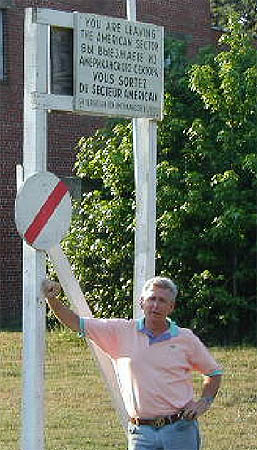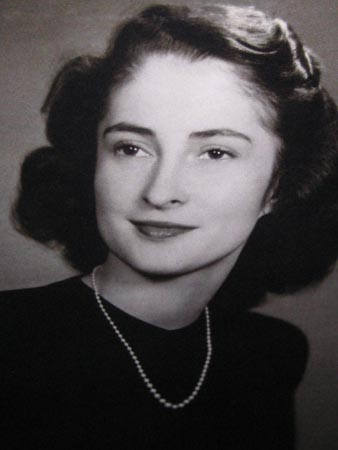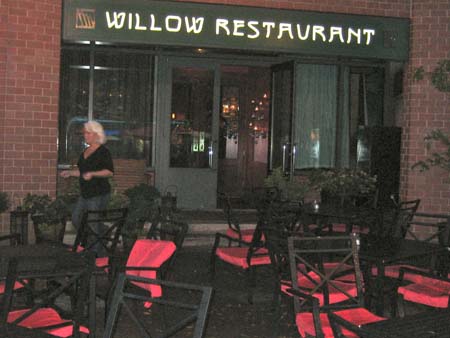Taps
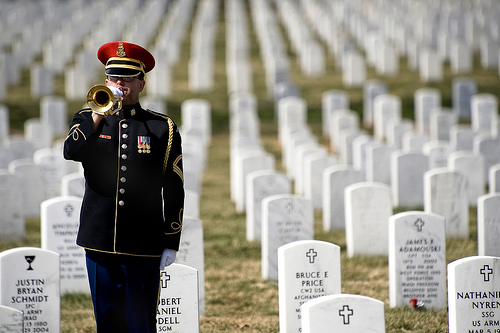
A lone U.S. Army bugler plays Taps at Arlington National Cemetery. DoD photo by Mass Communication Specialist 1st Class Chad J. McNeeley/Released
Normally I have to click the little time icon on the screen to see what the date is. The days go by so swiftly that it is hard to keep track.
Not this morning. There is a scrawled note next to the computer that is stark and simple: “MAC, 0815- 0730 in the shower!”
Checking the weather from the balcony at Big Pink, the skies have cleared and the rain has moved out to the open Atlantic to the east. It is clear but downright chilly.
This will be easier in some regards than the day just passed. In my book, any day in Washington that includes time in “Gaithersburg” and “Joint Base Anacostia-Bolling” provides a unique envelopment in the tangled roads of the National Capital.
This morning’s activity will be confined to the local area, but it will be much harder.
I am going to attend a ritual this morning that is horrifically inverted.
One of my old shipmates had a son who followed his footsteps into the Navy- as mine did last year. My pal’s son was doing an “individual augmentation” in Iraq and was in an IED incident that left him with extreme PTSD. Kurt killed himself last summer here in Virginia after being consumed by the trauma.
He left two kids and a woman who loved him. We rightly consider him to be a combat casualty who died on the field.
These Arlington funerals are conducted as a strange two-part iteration. I escorted my 92-year-old buddy Mac to Kurt’s memorial service in Leesburg three months ago, and now it is time for the Old Guard of the 3rd Infantry to take him to his final rest this morning in the Gardens of Stone.
I don’t know how to deal with the loss of a child. I am driving the Admiral to this one as well- he is alive and sharp and as much in the moment as I am.
Or more. He has had some time to think about all this, and I confess I am too busy to stop and consider the magnitude of eternity, and the fleeting moments of our presence.
Mac is such a contrast to my Dad, a naval aviator who once drove his mighty Skyraider across the heavens. Now, four years younger than Mac, Raven is just out of it.
Copyright 2011 Vic Socotra
www.vicsocotra.com
Be Happy
I have gone through a lot of napkins at Willow, between wetting them under a tulip glass of Happy Hour White and writing on them, but I was not writing on them last night. I was taking a break from recording stories and just relaxing.
It had been a busy and fairly productive day at the office. It is the eve of the first big Holiday week, after all, and a lot of folks will be out of town. It is a good time for it. No one knows what the impact of the Super Committee is going to be, and hence, no decisions are possible, or don’t seem to be, and I drafted a report for the companies on our team.
I have no idea what is coming, but a positive attitude is a good thing, and tends to breed positive outcomes.
That was one of the first things I learned in The Fleet. Trust me, a gigantic mobile aggregation of steel boxed filled with endless bangings-and-thunderings with nothing to do but work, eat and sleep for months on end is disconcerting.
It has a lot in common with a short sentence in a Federal Corrections facility, only louder.
On one of my first line periods out of Yokosuka I passed a Lieutenant Commander from one of the attack squadrons in the passageway just outside Mission Planning at frame 107. I greeted him with a little sardonic humor and he responded with a genuine enthusiasm and sunny smile: “Have a great Navy day!” He said. “It is great to be at sea again!”
I ducked through the hatch into the anti-room to the Mission Planning space and got a cup of day-old coffee. Sitting on a stool at one of the fold-down planning tables, I smoked a Marlboro from the $2.00 carton I bought at the smoke-shop, I considered the fact that he was happy, and I was not. The answer seemed plain enough, inescapable, really. Get happy.
It was just crazy enough to work. I was stuck there anyway, and with only a binary choice of misery or something else, I set about the business of getting happy.
Along the way, I invented a salacious and surreal detective story that I published each day in the ship’s newsletter, the Midway Multiplex. A chain of command that could be grimly serious actually interceded to protect my freedom of expression. It was hard time, but fun.
A decade later, the words of Bobby McFerrin’s infuriating song “Don’t Worry, Be Happy” summed the thing up. What I did not know at the time was that a capella hit wasn’t as mindless as my mantra from the USS Midway.
I hope I did not stick the song in your head this morning, but it is stuck in mine and I hope I can pass it along to you. The philosophy in the lyrics actually has a patrimony. The noted Indian mystic and sage Meher Baba often used the expression “Don’t worry, be happy” when communicating with his devotees in the West.
He died in 1969, a little before I had an interest in Indian spirituality, or planning strike missions against parts of the sub-continent where it originated, but I have seen the words on inspiration cards and posters of the era. The song became an improbable hit after appearing on the soundtrack of the tom Cruise vehicle Cocktail, and that is how I discovered that the Navy and mysticism had something in common.
It is actually a pretty neat philosophy in four words.
So, although things pretty much suck these days, I was humming as I pecked at the office keyboard. I started out my report this way:
“Gentle Colleagues,
It has been a while since I got you an update on the business landscape. We have had some interesting moments of late. On this dreary misty day I am curled up by the fire in my lushly paneled office high above Glebe Road in posh Arlington, listening to the monotonous drumming of raindrops on my mahogany desktop. This being the sort of damp day that calls out for hard-hitting reporting, I thought I would walk you through what has transpired in the last flurry of Government task orders and outline some events that will shape the award of the next Big One….”
I summarized some of the antics of the customer, and was just mashing the “send” button when two colleagues stuck their heads in the office and suggested we stage an Occupy Willow moment before the drive home.
“Dammit,” I said. “Be happy!” I shut down the computer, threw some things in my briefcase and decamped with them to the elevator lobby and the amble in the mist down the block, across Fairfax Drive, up the patio and into the bar.
Old Jim was holding down his end of the Amen Corner, and things were slow enough that we had a chance to flirt with Tinkerbell and our buddy Holly. There is a hint of sadness in her presence. She is leaving the staff to take a position of increased responsibility at the big sports bar down the block. Her last day at Willow is Saturday night.
While her loss saddens us, we are happy for her.
Jon-no-H and the Lovely Bea showed up presently, and my colleagues tucked into a signature flatbread and the tower-of-power stack of fish and chips. The happy hour white was making me feel the same way, and got a call on the cell from the Left Coast outlining a plan to commemorate the 70th anniversary of the Battle of Midway. Any time I get a little down, what with the daunting problems we confront, I can use a jolt of reality.
There are hard times, and there are HARD TIMES. It is all relative.
I said I would consider attending the ceremony in Honolulu next summer, and marveled at the concept of a trip that did not feature multiple cases of dementia and a snow-bank as the primary ingredients.
When I got back, Old Jim passed me a note written on a napkin and carefully folded into a square. I don’t trust notes like that. I was sitting in McP’s bar in Coronado one time with my pal, the legendary liberty hound JoeMaz, when a similar note was passed down the bar. We had attended a wedding for a Midway shipmate earlier that afternoon and as the soft dusk came over the village we were getting serious about shore leave.
We were still in full dress white uniforms, the ones with the stiff choker collar. I think mine was unhooked and open. I am pretty sure that JoeMaz had his cuffs rolled up to display the strictly non-regulation dragons embroidered on the underside, and a t-shirt with a bright red band on the collar exposed in his similarly undone tunic.
Joe unfolded the napkin, glanced at it and passed it over. “Commander,” it read in block letters, “You are a disgrace to your uniform.”
I put it down and looked up and down the bar, which I suddenly realized was populated by a platoon of SEALS from NAVSPECWARCOM on the Amphib Base adjacent to downtown Coronado.
“Would you consider this to be a threat?” I asked Joe.
He shrugged. “We might get our asses kicked. Do you want another drink?”
“Of course.”
The note this evening was ominous, too, but in a different way. I opened it and read these words: “Don’t be shocked. Management is actually going to count how many times they top off your white wine. Heard near the kitchen. Destroy this note.”
“Damn,” I said to Old Jim. “Do you what this means? Are you going to start another boycott?”
He shook his head. “No, and I am not worried about it. Some places I go comp you every third beer.”
“Those are real bars,” I said. “Not Willowesque bistros.”
“Exactly my point. This is the closest and nicest place on the block. Just go with the flow and we will see what happens.”
“You are right, Jim.” I looked at the level of the pastel beverage in the tulip glass in front of me. It was either half-full or half-empty, depending on how you decided to view it. “Screw it. Don’t worry.”
“Exactly,” said Jim, slamming his longneck Bud on the mahogany bar and reaching for a Duck taco. He munched hard and swallowed. “Keep ‘em coming, Holly. Be happy.”
Copyright 2011 Vic Socotra
www.vicsocotra.com
No Such Thing
They say there is no such thing as a free lunch, but I am not sure that is true. You know they used to put out a big spread of pickles and salty food “for free,” to encourage the working stiffs to come in and get really thirsty. The additional sales of adult beverages more than made up for the cost of pickles and chips.
They treat us pretty well at Willow, but the working principle is the same. We use the Amen Corner as a sort of auxiliary office. I was pleased that Mac is feeling well enough to get out as the season changes, and I dodged my way across the rush hour traffic on Fairfax Drive just a few minutes late.
Old Jim had his regular seat. John-with-and-H and Jon without were there, along with Jerry the Power Lawyer and Tarek from the office, looking imperially slim. Mac was seated one down with an open stool next to him, which I took with alacrity. “You are late,” he said.
“Sorry, late call at the office. “ I frowned. I had a pen, but forgot my notebook. Mac slid a stack of napkins across the bar with a smile.
‘You are looking good, Sir,” I said. His eyes were clear and his mood was merry. He was wearing a tan sport coat and sand-colored Aloha shirt and a glass of Happy Hour Red was in front of him.
“I feel great,” he replied. “It is good to be out again.”
Down the bar, Old Jim and John-with were working steadily on their Buds and Reds, respectively, and Liz-with-an-S was depositing an iced tea with vodka in front of Jon-without. His bow tie was an assertive power red.
“I wanted to talk about your third career, Mac. How you became a coordinator at Arlington Hospital for the support group.”
Mac took a small sip of wine. “Which one?” he said. “I was involved in several.”
He placed the glass carefully back on the bar. I notice that just having the there and available is as much part of the excitement as actually drinking it.
Liz-S topped up my white wine as she cruised past to re-stock the Bud locker behind the bar.
“Well, I understand that we are not going to deal with my time on the Intelligence Community Staff. Still some issues there. I told you how and when I retired in order to be a caregiver when Billie started to fail. The timing wound up being a net positive, since the Iran Contra affair unfolded quite without me.”
“Right,” I said, the point on my pen ripping a hole in the napkin.
“But Billie was still at home when I was diagnosed with prostate cancer in February of 1990.”
“Holy crap,” I exclaimed. “You have had cancer for twenty years?”
“More than that. We all get it, if we live long enough.” He described the process, and the drugs they prescribed to keep the spread at bay. “But that is how I got involved with the support group. There was a prostate cancer group at Walter Reed- there are three approaches to the disease,” he said, ticking them off on his gnarled fingers. “Surgery, Radiation and hormone therapy. I was in the latter group.”
“Man,” I said. “Those are all pretty hard options.”
“Or not hard, considering the alternatives,” he said with a smile.
“Right,” I said with a grimace.
“I thought Walter Reed was too far to drive, and started going to Georgetown, but the group there was more of a lecture thing than a discussion or support group, and with Billie still at home, I looked around and found a gent from NSA and some other gentlemen in Arlington on the hormone regime. I started a group that met at the house.”
“That must have been a busy time,” I said. “You founded the Naval Intelligence Professionals around the same time.”
“1986,” he said. “You have to stay busy. That is the key to things.”
Katiya the new girl was working as a server this evening, and will replace our buddy Holly who got a promotion at her other job at the Sports Bar down the block.
She slid an order of stuffed mushrooms in front of Mac and almost curtsied. Her dark hair is too short to be pulled back in a ponytail like the other bartenders, and accordingly was wearing a sliver tiara-like band on her head. “Complements of the kitchen,” she said, and moments later, Tracy O’Grady herself came out to work the crowd.
I felt a tap on my shoulder, and Ensign Socotra was there to collect on an obligation. He was wearing a green Spartan pullover and a fresh crew-cut.
“You tracked me down,” I said, reaching for my wallet.
“Not a tremendously difficult intelligence problem,” he said. I smiled and introduced him to the Admiral.
“Mac is more than an award for the top graduate at the Naval Intelligence Basic Course,” I said with a wave. “He is a real man and he is still here.”
Jon-without was walking back from the head and he stopped to touch the fabric of Mac’s jacket. “Nice coat,” he said. “Who is going to get it when you go?”
“Jon, WTF?”
Mac smiled. He is beyond that. “Might not fit,” he said.
“What size?”
Mac positively beamed. “Perfect 42 Regular,” he said. “I have had it for years.”
“That is my size exactly,” said Jon. “I will stay in touch.”
The conversation wandered back over some of Mac’s Navy career, since I wanted my son to hear it straight from the horse’s mouth, so to speak, and Jasper the Guamanian bartender was surprised to find that Mac spent the better part of 1945 on Nimitz Hill on his own island. There was an immediate rapport- though Jasper was quick to point out that he was not a Chamorro, but of Philippine ancestry, which caused us to lurch off into a discussion of the way things were, back in the day in the wild-west Philippine Islands, and some of the other half-forgotten islets of the western Pacific.
“Johnson Atoll is nothing but an airfield,” said Mac. “That is all there is to the place.”
“They built a facility to incinerate chemical weapons there later,” I said. “End of the line for a lot of things.”
Mac nodded. “We stopped there flying with Admiral Nimitz’s staff on the way to Guam. Coming back, we stopped at Kwajalein for fuel and breakfast.”
“How was it?” I asked, and Mac laughed.
“I was headed back to Makalapa Crater and six months as the acting Fleet Intelligence Officer. The war was over, we were all going to live, those of us who were, and Wendy Furness was left at the Combat Intelligence Center up the street with the charter to get rid of all the Japanese captured material, lock up the building, and walk away.”
“Amazing,” I said. “One moment there is one thing going on, then, ‘Poof!’ the whole thing is over.”
Liz-S appeared in front of Mac and asked if she could top up his glass. Mac nodded affirmatively. “Put it on my tab,” I said.
“One other thing,” said Liz-S, topping him up. “I am headed for Maine in the morning, but I wanted to let you know that from now on, you drink for free here at Willow.”
“I’ll be damned,” said Mac.
“Not yet,” she said, her chestnut ponytail swaying.
“What about me?” bellowed Old Jim from down the bar.
“No one is that crazy,’ said Jake, sliding onto an open stool next to Tarek. “But I think we should formalize that commitment.” He produced a pen and began to write on a napkin. When it was done, it looked like this:
“Nov 15, 2011
To Whom It May Concern:
Given this day, under my hand, and on behalf of the establishment, the aforementioned (or not fore mentioned,) Willow, do attest to the fact that for life, RADM “Mac” Showers, USN-Ret, Will drink for free.”
He slid it across to Liz-S along with a dollar bill to serve as consideration and make it a legal contract. She signed gravely, not only tending bar but having been admitted to one in New York and New Jersey.
Mac was positively beaming. “Who said there was no such thing as a free lunch?” I said.
“The hell with lunch,” said Mac. “I will take the wine while I can.”
Copyright 2011 Vic Socotra
www.vicsocotra.com
A Turkoman Yurt
Not a good start to the day. Skies are gray and smell of moisture. The first enotes in the morning queue are about family and money- the inbound ones were written at the end of someone’s day, and my querulous responses are drafted at the beginning of mine, and not caffeinated enough.
I should know enough to put it all aside, but this is pretty emotional.
You may be familiar with how this works- or doesn’t- between strong-willed people if you have been down the rapids. I am not, though I am learning, and am very uncomfortable with the whole thing.
It is not the end of the road for Raven and big Mama, but I can see it, or at least the end of the road they are on at the moment. I am reminded of that old saw about “Gentlemen, we have run out of money and must now begin to think.”
Crap.
Consequently, I have been thinking, and applying the lessons of this chapter of my parent’s lives to the one that I am living and what I may have do in the stretch of road that is ahead. That is why I was thinking about yurts- that marvelous circular Mongol tent that is covered with sheep-felt, and impervious to the elements and suitable for rapid movement.
It is a step up from living under a bridge abutment, and as a former intelligence officer, I believe in having “Plan B” just in case it is necessary. “Ecological and practical,” is what they say, and I am all over that. Of course, I have never actually lived in a yurt, and do not know where I would hook up the ice-maker or plumb the Jacuzzi, so some of the details remain a little sketchy.
I have a pal in Utah, though, who has. She wrote this morning to share her recollections of what it was like, in a land far away and now lost in time:
“Vic, your commentary on yurts today took me down memory lane…
Kabul was a wonderful city! My visit there in 1972 was the only visit I made to Kabul, although my parents vacationed there often, loving the sophistication of the city, the excellent wine produced there from very old vines, the wonderful bazaars, and the beauty of the surrounding mountains.
On this trip to Kabul, we stayed in a hotel (cannot remember the name) that gave us the option of staying in lovely guest rooms or staying in one of their few yurts. If we wanted to stay in the yurt, we had to reserve in advance. So, stay in a yurt we did!
I wish I could say I remember in detail the experience. But the memories have faded with a life-full of extraordinary and memorable experiences. I do recall it was fun, comfortable and a great experience.
And I well remember how much I liked Kabul. How it was fun to see the women so stylishly dressed with their short skirts and high heels peeking through the black coverings they wore….but no burkas, no head covers….just a black, flowing robe-like garb that floated open to show their up-to-the-minute dress styles. And the women were professionals….doctors, lawyers, professors….and they walked alone throughout the city. It was modern – and well on its way to moving out of past centuries into the modern world. But that was then……It all seems so very much longer ago than 40 years.
Thanks for the mental poke about yurts….I always think of that too-short stay in Kabul, when I slept several nights in a yurt, whenever I hear that word…”
I scratched my head. I had intended to take you on a survey of American yurts, manufactured with modern materials and the level of comfort that is possible to achieve in the nomadic lifestyle that may be thrust upon us in the transition from the American Century to whatever is coming next.
I was even going to be clever and recommend that the Occupy throngs investigate yurts in their effort to camp out on public land. I can see them all over Central Park, which is where the Wall Street throng claims to be going, now that they have been forcibly evicted from Zuccotti Park. Yurt living would make this a relatively comfy winter for expressing First Amendment Rights on land that does not belong to them.
But I had to think about the first time I saw yurts, and began to write back:
“Absolutely lyrical!
You took me down a mental road, too. My Kabul recollections begin with Kipling’s “Stalkey & Company,” in middle school- an account of training for the Great Game in an English Public School. Then there was reality from the travel of a buddy on an around-the-world hippy hiking trip- around 1974 or so. Porky came back wearing tribal garb and regaled us with tales of the fabulous hashish and living in yurts and the time a Pashtun tribesman rode up to him on horseback and appropriated his watch.
A few years later, I found myself afloat on the mighty ship Midway as we approached Christmas of 1979. We were not completely sure why we are there- certainly the Fall of the Shah had a lot of the local Sunnis nervous- but the Embassy had not been seized in Tehran just yet, and we had no idea that we would be back so soon after this seemingly endless deployment.
Frank was a nerdy guy who was assigned to A-6 Intruder squadron (“World Famous VA-115!”) as the Radar Scope Prediction officer. He maintained the files of prospective targets that provided precision radar guidance for dropping bombs. It gave us an all-weather capability, and made the Intruder a powerful weapon in the night.
Frank did not have much to do, once all the contingency missions had been planned, and was following what was happening up north as the new Afghanistan began to die.
On October 31, Soviet informants in the Afghan armed forces were ordered to perform preventive maintenance on their armored vehicles that Soviet premier Brezhnev had thoughtfully provided the previous summer.
Telecommunications links to areas outside of Kabul were severed, isolating the capital. With a deteriorating security situation, Frank looked at reports of satellite imagery (this was long before the actual timely images could be provided over the available bandwidth to the Fleet) of large numbers of airborne forces massing at bases in the Soviet Union.
They began to land in Kabul and Kandahar on Christmas Day as the frozen turkeys were thawed and cooking on the mess decks.
The smell of the mess decks on a aircraft carrier is a thing of wonder.
The Soviet 40th Army came across the border by land. We were amazed by what was happening right before our eyes as we circled in endless donuts in the pale blue waters of the North Arabian Sea.
On December 27, 1979, 700 Soviet troops dressed in Afghan uniforms, including SPETZNAZ and KGB formations, occupied the major military, media and government buildings in Kabul, including their primary target – the Taiberg Palace.
You remember what came after that; the Carter Discomfiture, the Olympic Boycott and the descent into anarchy and brutality that was sparked by our support to the Mujahadeen, and the ruthless and hyper-violent Russian attempt to suppress them.
It all made Charlie Wilson’s War so poignant when I saw it a couple years ago. The real war, the real victims, were the stylishly dressed women of the capital, and their sisters in the countryside and the children. That was when the new Afghanistan died, and the old one of a vengeful Allah swept back.
My pal Sid was assistant Naval Attaché in Delhi, the other capital of the Great Game, and about the time you were staying in a rental yurt there in Kabul, he took a VW Microbus filled with Navy Nurses up the Khyber Pass and through Jalalabad on the road to the capital- a joyful and exotic trip.
Now gone, so thoroughly gone, that the monuments in the rocks to the units of the long-gone Empire are all that is left.
Oh, and of course the yurts.
Although the Turkoman people of Afghanistan are now a sedentary people, they were originally nomads, herding their flocks of sheep and goats across the rolling steppes of Central Asia. They lived in yurts, circular domed tents seen from Mongolia to the Caspian Sea.
These yurts are easily dismantled and reassembled. They are lined and roofed with felt and skirted with thick red matting, the whole being bound with woven tent bands.
During winter, an open fire burns in the center of the yurt and the smoke from the manure-fed fires leaves though a chimney hole in the roof. The fuel leaves a pungent smell and soon blackens the felt walls and ceiling. The inside closure of the Yurt was a carpet of special design called a Purdah (curtain)- although there is a lot more about that, if you care for nuance.
Occupy Wall Street could take a page from the Turkomans. And maybe we all will. Photo Art Page.)
Copyright 2011 Vic Socotra
www.vicsocotra.com
The Yurt Life
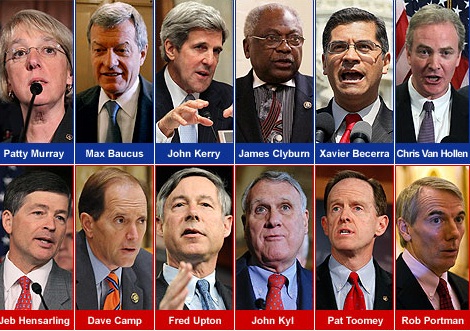
The Congressional Super Committee. They are figuring out how to save our Way of Life by next week. Figure the odds. Photo Getty Images.
I dunno. Maybe there is hope.
Some rumblings have emanated from the super-secret Super Committee has precisely nine days to find a $1.2 trillion bucks in budget savings or else a draconian trigger whacks discretionary funding across the Executive branch. Should that happen, the government accounts in Defense and the Intel Community on which my comrades and I depend for a living are going to be savaged.
If it happens, that is likely to make for a bleak Christmas.
Thankfully, this is a town of smoke and mirrors and hot air that moves the mystery around. The latest is that the deficit reduction panel is constructing an “escape hatch” from the rigid binary choice that theoretically limits what the legislators can do.
We have all sorts of cool things in Washington- “lock boxes,” “escape hatches,” Congressional bodies with Super Powers. It is awesome.
Under the novel trial balloon floated this weekend on the hot air is the notion that there could be an accord on revenue levels (that means “taxes”) but delay for a year the tough decisions about exactly what would be done to the impenetrable and Byzantine Tax Code.
More power to the Panel, and more power to the post Berlusconi-government of Italy who has installed sober technocrats to avoid default, which could, in turn, bring down the banks on this side of the Atlantic.
I hope they can both do something constructive, though it is beyond hope that a compromise on Italian austerity and US taxes and spending can be brokered with any specificity by Turkey Day.
I was thinking about that on my long drive in the country this weekend, and the consequences of big cuts to the contracts I manage. The impact to those on fixed income- a class of citizens that I am afraid I am headed to join- is going to make my current lifestyle frankly unsustainable.
There were a bunch of other citizens out on Virginia’s scenic highways. There were rattletraps out there, and there were fancy SUVs hurtling to and from Charlottesville and points south to the Carolinas and Florida. There were also the snowbirds, the people in those fancy Ford F-250 trucks with the goose neck trailer attachment and the long trailer behind and a little sedan hooked to the back of it.
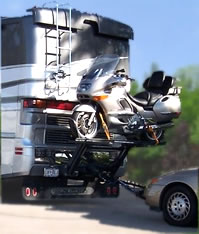
Enterprising Nomad seen on Virginia Rt-29, completely covered with spare sedan and motorcycle. Photo American Eagle
That is one approach, anyway, and I saw all of them. Buses in a variety of sizes and levels of luxury. Smaller camping trailers, too, but what they had in common was a white guy at the wheel with his knuckles white as the four-wheelers like the Bluesmobile rocketed by.
I get the concept. Hang on where you have a permanent residence until it gets too cold, and then just pack up and head south. I could get behind that. Michigan is lovely from May to October, but then when the cold winds blow it is dark and cold and frankly unsustainable by anyone sane.
I understand why Raven and Big Mama retired up there, but they appeared to survive the winters by retreating into their zone of comfort in the master bedroom.
Suppose, I thought, I had to slash costs to the bone. Get rid of the property and see how to make existing resources stretch to accommodate a new and more austere reality.
The Recreational Vehicle lifestyle has its proponents, but I am not sure an dinosaur dependent on fossil fuel and white knuckles is where I want to be. Raven had wanted to refit a school bus one strange summer, for wandering plans best known to himself.
Parking the Bluesmobile out in front of Big Pink when the drive was over, I thought that would be about as much as I could handle on the road. Suppose
What did the nomads of old do, before the Airstream Era dawned?
In North America, there was the ti-pi, and good old-fashioned canvas tents. But there is a better answer, one that equipped the Golden Hoard of the Mongols.
I am thinking, naturally, of the yurt.
The word comes from the Russian Yurta, which describes a felt-covered circular structure with trellis walls reinforced to support the ribs of the roof.
The roof is supported by a conical or domed frame consisting of a number of ribs radiating from a central wooden wheel to the top of the wall trellis. The yurt is traditionally covered with felt, made by beating and rolling wet sheep fleece.
The latter sounds like fun, but I am betting there are vendors who will take the last step out of the process.
There are three main types of traditional yurts:
Kirgiz (bent-wood roof poles and crown and a domed overall shape)
Uzbek (two-tiered with a pointed roof and two layers of wall section placed one on top of the other.)
Kalmuk (straight roof poles, a heavy timber crown, often supported by two upright poles, and fitted with a wooden door. Also known as a “ger”).
The last is the type that the hardy Mongolians used to scourge central Asia and threaten Europe, and that is the sort of patrimony I am looking for.

Could there be a Kalmuk ger in our future? Only the Supercommittee and the new Italian government know for sure. Photo Oregon State Government.
The Ger is perfectly suited to a nomadic lifestyle, and has been tested for thousands of years in the world’s most inhospitable climates, with high winds, rain, snow and temperatures that routinely fall to -58ºF.
That would work in Michigan, but I am really thinking about a yurt that would fit in the bed of a pick-up truck, move south with a languid sort of imperative and have an ice-maker.
More on those requirements tomorrow, since it is Monday, and for the moment, I have a job to go to.
Copyright 2011 Vic Socotra
www.vicsocotra.com
A Drive in the Country
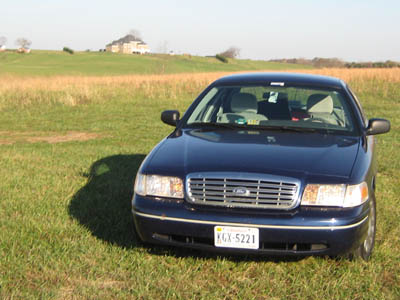
The Bluesmobile on the battlefield at Brandy Station. The ugly house in the background was deliberately sited on the spot of J.E.B. Stuart’s Headquarters during the largest cavalry engagement in North American history. Photo Socotra.
So peaceful down on the farm. Heckle is so glad to see me. The grass is neatly trimmed- thanks, Frank!- and town was bustling with pre-pre-seasonal shoppers on the main drag.
This is a great circle trip- down I-95 from the Capital, off on the strip-mall chaos in Fredericksburg and west on the Germana Highway, cutting across the Chancellorsville and Wilderness battlefields until the bright orange trees on the bulk of Mount Pony appeared ahead.
Going back north I will take Rt 29 up through Brandy Station and McClellan’s Last Parade and the Buckland Chase as the country fades into the sprawl around the fields of First and Second Manassas.
This is my favorite time of the year. Sure, it means that the chilly winds are going to sweep this all away, but the corn stubble and the ancient cannons evoke a spirit of closure. These places were, in their moment of history, as dangerous and deadly as any in all the world.
The foundations of Chancellor House are preserved at the intersection on Rt. 3, and the cannon behind the bricks and stone are arrayed as they were on that day, facing other guns across the black road and the dun-colored field.
The WalMart people have decided not to construct their latest mega-box on this road, not far from this place. That is a good thing, I think. There are plenty of places where nothing much of consequence has occurred and never will. This stretch of highway has seen far more than its share, and the vista of the old farms on low hills should remain for others to see in brightly hued seasons like this.
Now they are peaceful, and the sound is of the fresh breeze rising through the remaining brightly colored leaves. The soft sibilant sigh is like waves caressing on a distant shore
I wonder what it would be like to be on horseback in some of these fields, galloping. Or just ambling slowly without a care in the world. That is an unlikely scenario. There is so much that seems important during the week, but here are small houses of people who work in the country, connected to this land.
It is sixty-five miles from the flanks of Mt. Pony to the lozenge of the Beltway that girdles the capital and strangles civility. It is nice down here, with the lonesome sound of the trains signaling at the grade crossing in the rich deep velvet darkness.
With the light rising, stealing across the pasture, the day beckons.
Nice weekend for a drive. Nice weekend for colors. Nice weekend to be alive.
Vic
Navel Gazing
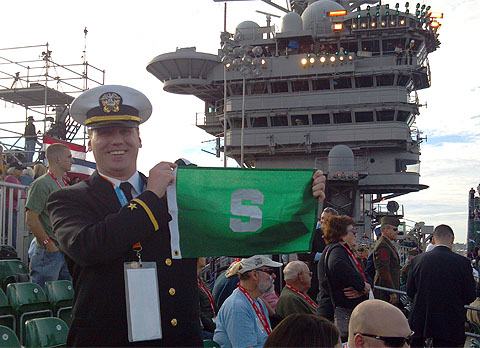
ENS Socotra on USS Carl Vinson. I have one of the President, too, but you have seen plenty of those. Photo courtesy of another Socotra
I am going to head down to the farm on this lovely Fall day.
We had a front come through with rain at mid-week and when it cleared out it left all things clean-washed and chill. It is supposed to warm up later, and I want to hang out on the deck and see if the deer come out. I will not venture into the woods though- I don’t think I have enough orange in my wardrobe.
I was going to write something this morning, but the Veteran’s day experience was a little daunting. There is something about the recollection of all that sacrifice by so many in the aftermath of the fall of the great empires. It is the world we were given, and I do not look down on armies (or peoples) who have lost so much in great retreats.
We are on one ourselves, self-inflicted, as you know. The situation plays a little toward the painful problems at Penn State- our inclination to let things ride rather than make tough choices. So much wrong there, and so profound. The rumors above what Coach Sandusky was up to with his Second Mile Foundation and the possible links to a wider shadowy ring of pederasts is just downright creepie.
But wait, as they say on the commercials, there is more.
Should the EuroZone fall apart, and another wave of bank failures spread to these shores, there could be some real misery that did not have to happen. The road back from the abyss will be a challenge.
I don’t pretend to know what will happen, but there are demographic forces at work that will leave some nation states in the dustbin of history in this century, but America is not one of them, at least at the moment.
I can see a Chinese Siberia in the not-too-distant future, and empty villas across the southern tier of Europe.
But that is liable to be at a time when I am no longer in a position to do anything about it.
I do know that my son made it to San Diego and saw the President and the First Activist on the USS Carl Vinson, and that the wine was crisp and fresh at Willow, and Katyia the new waitress from Belorus has dancing dark eyes and Jon-no-H and John-with were in rare form, the duck pot pie was delicious- or at least it looked that way- and Jason is confronting his future as an independent entrepreneur with confidence I could not muster.
Elisabeth-with-an-S is gamely going to pass that pesky Virginia Bar and stop tending Willow’s, and our buddy Holly is moving on, and Jasper the Great Guamanian is going to finish inking both of his arms as fully colored tattoo sleeves. Old Jim is coming back to Willow, all is forgiven for the misunderstanding about Kate’s bread, and so, while this is all falling apart, there is still some fun to be had.
I am going to enjoy the last of the leaves today, and contemplate nothing but my navel.
Copyright 2011 Vic Socotra
www.vicsoctra.com
Over There
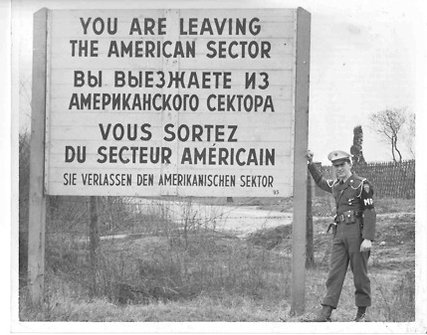
Check the NYTimes pictorial on America's Veterans this morning. This shot is of Spec. George Adamovich as a military policeman Over There. Courtesy of NYTimes and George Adamovich.
The moment has passed here in Arlington, the real one. You know what I mean- two minutes of silence observed at the Cenotaph in Whitehall at eleven o’clock sharp, the symbolic moment that the Great War came to an end on the Western Front. A cenotaph is an “empty tomb,” or monument erected in honor of a person, or group of persons, whose remains are elsewhere.
They have erected them in honor of Congressmen who died here over at Congressional Cemetery on the Anacostia River, and the dog walkers use them as fire-hydrant substitutes.
The famous one is in London’s Whitehall, though there is an impressive copy in Hong Kong, an example of how ephemeral things really are in this world.
In the UK, it is perfectly acceptable to talk about The Dead, capitalized, even if the word Glorious” has been dropped of late. There were so many of them, mostly from that one generation, frozen in time, and who never grew old.
To give some perspective on all this, British Empire servicemen who died numbered just about 1.1 million, a fraction of the total of what the warring nations inflicted on one another, but staggering for an island nation’s demographics.
Armistice Day has been through some changes since then. The magnitude of the second installment of the world conflict forced a change in name in the interest of inclusion. That is what brought The Greatest Generation into the tent, and the Korean War and Vietnam vets, and down to Gen X on the battlefields today far away.
“The Dead” as a phrase has a particularly evocative resonance this morning. The Departments of the Air Force and the Army have been pilloried for incompetence and callous disregard for The Dead. You are familiar with the debacle of the mis-identified graves at Arlington, I am sure. More troubling are the reports from Dover AFB in Delaware, where apparently unidentified portions of America’s Fallen were incinerated anonymously and dumped in landfills.
I am not going to go there, either in blame or horror. I know people in the funeral business, and the disposition of earthly remains is a complex business and not for the faint of heart, considering the astonishing manner in which some of us leave this life.
We don’t hear much about it, thank God, but over drinks at Willow with members of the Murphy Funeral Home there were stories that were enough to curl my toes. They cater to the suburban trade, mostly, but proximity to Arlington means they are a receiving home to many of The Dead who are headed there.
Besides, there is the change in how we treat those we love and remember. The notion of the grand memorial tomb has come down a bit in these times. With the rise of popularity in cremation, there are plenty of us who have been scattered willy-nilly across beaches and hills.
Or are perched on someone’s mantle, awaiting the right moment for transition. It is all part of life, which is chaotic and brief and wondrous in its complexity.
There is enough other stuff going that should be attended with righteous indignation that I guess on this day, 1100, 11. 11, 11, we can settle on something that we can all agree on.
Fixing Dover and Arlington are things we can actually do something about.
We will have a chance to observe two minutes of silence here in a few hours, and I will try to remember in honor of all those who fell.
Here and there.
Copyright 2011 Vic Socotra
www.vicsocotra.com
Quicken Loans Carrier Classic
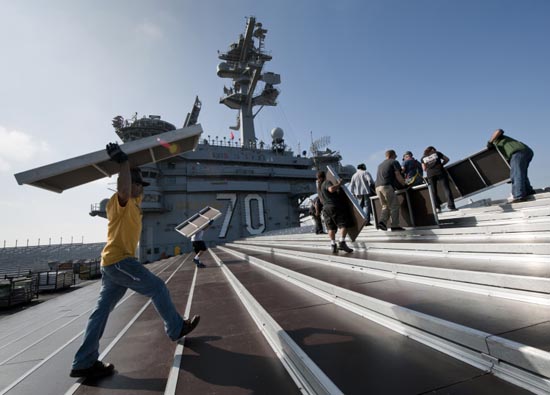
Contractors assemble bleachers while building a basketball arena on the flight deck of the Nimitz-class aircraft carrier USS Carl Vinson (CVN 70). Navy Photo.
I am so far behind this morning that it seems hardly worth starting. I had a request from son Eric to drive him to Dulles to catch an early flight west and I could not pass up the opportunity to share a little time with him.
He won a lottery of some sort and got a ticket to the UNC-MSU basketball game to be held onboard USS Carl Vinson (CVN-70) in San Diego Harbor. The inaugural Quicken Loans Carrier Classic basketball game will be played tomorrow on Veteran’s Day, Nov. 11.
He is traveling in his blues, since that is the uniform of the day for the game. He looked pretty squared-away when he stepped out of his high-rise in Ballston and threw his bags in the backseat of the Bluesmobile.
He was pretty jazzed.
I assume this stunt is intended to demonstrate the relevance of aircraft carriers in the budget environment that is coming.
Vinson’s gray, 95,000-ton hull is the one from which Scumbag bin Laden was dropped with appropriate ceremony into the Northern Arabian Sea. The game tomorrow will be used to seize the spotlight to showcase the Navy and its awe-inspiring, multi-billion-dollar aircraft carriers to the more than 3 million viewers expected to watch the game on ESPN.
My older boy called to tell me he would be open to doing something, since all the civilians in the government get the day off to honor the vets who have to work on the outside.
President Barack Obama, a passable hoopster himself, will be onboard Vinson for the game.
The role of the Nimitz-class supercarriers in modern warfare has been part of that discussion with critics questioning whether anti-ship weapons have turned them into white elephants that are too expensive to risk losing in a war. In 2015, the Navy plans to add to its fleet the Gerald R. Ford, the lead ship of a new three-ship class of supercarriers. Each is expected to cost about $9 billion.
Critics say the United States now has too many carriers, and the Navy can do the same missions with smaller, more economical vessels.
I think that is horseshit, but I am more than a little uneasy that my son could be onboard one of the behemoths when the Chinese lob a DF-31 nuclear-tipped ballistic missile at it in the South China sea. I am painfully aware that the next time nukes are used, they are liable to be in the maritime context when there is no evidence of what happened left behind.
With 11 carriers, the U.S. Navy has more than the rest of the navies on the planet combined, which is just the way I like it.
I actually did talk to a Swedish investment banker the other day about the situation in Europe, and it is grim. The bit on copper was quite true. I think they are going to have to play the inflation card; perhaps Chancellor Merkel can figure something out to save a currency. Certainly the Tories of old can be satisfied that they did not abandon the Pound, though of course when the house is on fire it is not much consolation that the milk money is on the counter in the kitchen.
There is a dreamy sense of sameness as the financial crisis has rolled from Greece to Spain and now to Italy.
By the way, Italy’s economy is ten times the size of Greece’s, and that has yet to find a permanent solution. Italy is too big to fail and too big to bail out. My pal in Colorado monitors the situation through several financial services. He sent me one account that was chilling this morning. I read it before I headed down to fire up the V-8 on the Bluesmobile and claw our way out to the Dulles access road:
The Summary from Barclays Capital went on to hit thirteen key points about why Italy is going to go down, but I will leave you with some key bullets out of the larger peice:
“Italy is now mathematically beyond point of no return – growth and austerity not enough to offset cost of debt- – ECB remains unwilling to be lender last resort on scale needed- (but) frankly will have hand forced by market given massive systemic risk.”
Barkley’s appears to be calling for a “quantitative easing” by the Central Bank, but the Germans have already been to the hyper-inflation show in the Weimar Republic, and you recall how well that turned out.
I was thinking about my market position on the way back from the airport, that and what to do about the situation in the little Village on the Bay.
The afternoon market close now serves to remind me to call Big Mama each day and monitor how she is doing.
Some surprising things on that front. She does not appear to miss Raven; has been getting up for breakfast, something that did not happen with his irregular sleeping habits, and she has been talking to the other residents as Carla (or someone) seems to be vectoring her to different tables at mealtimes.
Her delusion is profound and opaque; there is something about wanting to see us all clad in white; something about the babies, and the business that must be accomplished; the movie de jour is part of it, as is the menu and the people in the dining room, some of whom are actors, some owners of the facility, and others simply mad.
I intend to take her to an old friend’s house for Thanksgiving dinner, and leave Raven in his roost. Mac says not to take Mom on visits to The Bluffs to see him, and I am inclined to take his advice. This is so expensive that it almost boggles the mind. I doubt if the system is going to be able to take all of us Boomers into the dementia wing. I have no idea what to do about it; there is not enough money on earth to provide care for us.
Got to get organized here; I am not sure why. Not having sovereign debt, or much money, I can’t inflate my way out of this. And there is not an aircraft carrier to spare to sail away on.
Copyright 2011 Vic Socotra
www.vicsocotra.com
Helsinki
John-with-an-H strolled into the Willow and took Old Jim’s stool at the Amen Corner. The bar area was ding a brisk business as I organized my notes, and Mac was happily picking at his pomme frites and sipping his happy Hour red.
John-with took the iPod buds out of his ears. “I was hoping to save Jim’s place,” he said.
I turned to face him. “Not going to happen. He is in bumfuck West Virginia this week,” I said, and heard the muffled ring-tones of my Droid phone in my pocket. I fished it out and saw on the screen that it was a private number, so I apologized to Mac and stepped out through the vestibule to take the call.
“Hello?” I said, walking out onto the patio in the darkness.
“This place is awful,” said the muffled voice of my Swedish financial advisor.
“What do you mean? I thought you were in Rotterdam this week.” That had been the place of origin of the last communication I got- the near melt-down of the EuroZone has caused a lot of travel in the business, trying to put together gigantic deals between leviathan banking houses.
“No, Helsinki. This hotel has shag carpets and brown curtains. It is sooo 1970s. Appalling. I have one of the big Italian firms coming in, and we are supposed to take a helicopter to look at a hole in the ground in the Finnish Arctic.”
“What is at the bottom of the hole?” I asked. “Are commodities the way out of this mess?”
“Copper. The site is at Kaamajoki, up by the arctic circle. The formation is a geologic layered intrusion ten kilometers long and two clicks wide. This could be the future of a key commodity.”
“I heard that copper is having a renaissance,” I said.
“Absolutely. That is why I am bringing the Italians up here. The hybrid powertrains in the smart cars require a lot more copper content. Plugin hybrids are going to increase the demand for electric power from the grid.
“I imagine the demand for renewable energy like solar panels is going to increase demand for copper in the building sector, too.”
“Damn straight. We don’t know what else to hedge on. Things are so crazy here. Anyway, we are taking a helicopter to the mine tomorrow. The only other way is an old access road the Nazis cut back during the war.”
“Be careful,” I said. “Those reindeer can be vicious. And should I be moving to a position strong on commodities?”
“It is the only thing I can think of at the moment. You could go short or long on just about anything these days, since nothing makes sense. But I don’t know what the Italians will think of the shag carpeting and brown curtains.”
“I understand their fashion sense,” I said, wondering if there was a way to leverage the information. “Berlusconi is toast.” I held my wrist up to the light that flooded out of the bar so I could see my watch. Trading would start in Berne on the Swiss exchange in eight hours.
“Thanks for the update,” I said, and the call from Helsinki dropped.
I walked back in the bar where Jon-with-no-H was getting a vodka iced tea from Liz-with-an-S.
“The lovely Bea will be along presently,” he said.
“Cool.” I signaled Elisabeth for more wine and turned to the Admiral. “Sorry about the call, but it was from Helsinki. We were talking about why you retired from the IC Staff.”
Mac looked thoughtful. “Yes. It was right when Billie was diagnosed with early onset dementia. It was Alzheimer’s, though we did not call it that when things started.”
“I am curious about how it progressed, Sir. We noticed Raven was struggling to hear things when he was 84 or so.”
“I don’t think that is what it is,” said Mac. “More likely it was the manifestation of cognitive impairment.”
“I believe that. He had about six sets of hearing aids and couldn’t keep them straight. So when did you know that things were starting to go wrong? I am trying to figure out how long this could go on.”
“All cases are different,” he said. “Billie was struck when she was only 59, and lasted 20 years.”
“Yike,” I said. “I got the first bill for Raven in the mail on Monday, and it was $7,200 for the first full month in The Bluffs. That isn’t going to go far on twenty years.”
“Billie went to the nursing home at the ten year point. It was subtle at first. She had been a Registered Nurse when she was younger, but turned to real estate. She was a listing agent and then a broker for 17 years. She was out previewing homes in McLain, an areas she knew fairly well and got lost. She drove in circles for a quite a while before she saw something she recognized. It scared her.”
“I imagine. My Mom was still driving last year, and one time she made the trip from suburban Detroit to the Village by the Bay in like eight hours. That is enough time for a full round trip, so God only knows where she was. Raven was no help, of course.”
“Then the real estate firm installed a new switchboard at the office, and the brokers had a regular Navy-style watchbill to take phone calls on the weekends. I would go with her to manage the equipment, since she could not figure it out.”
“Yeah, the computer and the internet went away for Mom last year, just around the time my sister Annook moved them out of their house.”
“It was only a couple months more she could work. Then she had to quit. She had been really good at what she did, but couldn’t do it anymore.”
“Mom is in and out of it,” I said. “She seems to be having a better time the last few days with Raven not sitting on top of her.”
“They have their good days and their worse ones,” said Mac, taking a sip of wine. “My daughter and son-in-law were transferred to Ford Headquarters outside of London and we decided to go visit. Billie was adventurous, and she said that she was not going to go unless we could stay for a while. I said I couldn’t take more than two weeks, and she said that wasn’t enough. So, I decided to retire.”
“Boy, I would like to do that. I would have to hit it big in commodities to afford it, though.”
“As it turned out, we spent six weeks. That would have been 1982. We took the train all over and saw shows and had a chance to catch up with friends we met in the early ‘50s when I was assigned to CINCNELM headquarters on North Audley Street in London. It was a nice visit.”
“I have heard that the Navy walked away form the Headquarters. The dollar-a-year lease that Dwight Eisenhower signed in 1943 became too expensive for today’s force.”
“Pity. It was a great place to be posted. Anyway, the kids wound up being there for nearly four years. They had a nice little place in Warley, outside the Greenbelt. Two years after that first visit- that would have been the fall of 1984- they wanted to take a safari in Kenya, and we offered to come over and babysit the grandkids. We intended to stay on when they got back, right through Christmas.”
“How did that go?”
“Not so well. Billie would ask me every day if it was time to go home yet. That was the only thing that interested her. I changed the tickets to go back the day after the kids got back. They were a little surprised by the development, and they picked up and went back to Tulsa for the holidays. They actually left before we did.”
“That sounds like one of those sudden changes, like when Raven forgot how to shave, and Mom decided she did not want to take showers anymore.”
“Exactly,” said Mac, carefully drawing a French fry out of the basket in front of him. “After that, anyplace we went I would get two questions: ‘Why are we here?’ and ‘can we go home.’ I drove her down to one of her favorite places in the world, the big mall at Potomac Mills. She loved that place. We got there, walked around for a minute and went straight home.”
“I guess the home thing is big. Mom seems to have lost that.”
“When I put Billie in the Home, the nurses were great. I told them that she had been an RN, and they asked her if she wanted to go on rounds with them. She thought she was helping, and I moved some of her things in and my son and I left before she got back to her room.”
“That was at the ten year point?”
“Yes, it is an insidious thing. But I never heard about home from her again.”
“I was wondering if I should take Mom to visit Raven. Is that helpful or does it just get everyone agitated?” I asked.
“Two schools of thought on that,” said Mac firmly. “Some families took their people home. Billie never expressed an interest, and it seemed smarter to just keep her where she was comfortable.”
“She was there ten years?” I asked, crunching the numbers.
“Yep. There comes a point when they forget how to walk.”
“I guess that is what is next for Raven,” I said. “He might as well be in Helsinki.”
“It is a cruel thing,” he said, and finished his glass of wine.

